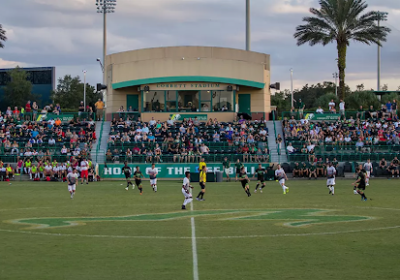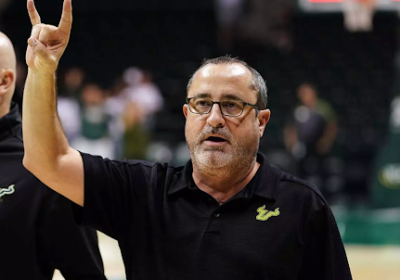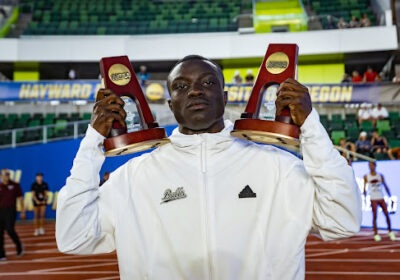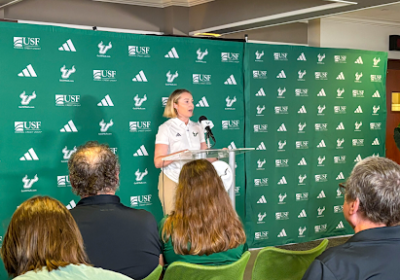Q&A with Brian Gregory

Coach Brian Gregory has stressed that rebuilding the program hinges on his ability to revive local recruiting.
ORACLE PHOTO/JACKIE BENITEZ
Newly hired USF men’s basketball coach Brian Gregory faces a tall task in reconstructing a program that hasn’t had a winning season in five years. The Oracle’s sports editor, Vinnie Portell, recently sat down with Gregory for an exclusive interview to find out his plans for the offseason and creating a new culture at USF.
Q: How do you motivate these guys after a season like this, especially with them having a long time until they play again?
A: It is important that our guys understand that because of the situation in the past and the lack of success, they need to take some ownership of that as well and have a little bit of a chip on their shoulder that they’re going to be part of the change. They need to take great pride in that because that’s the legacy they’re going to leave here.
Q: When you went to Georgia Tech, it wasn’t too dissimilar from this situation and they turned into a winning program, but it took longer than you probably would have liked. What did you learn from there that maybe you didn’t realize at first that you can use here in rebuilding USF?
A: I did learn that it does take some time. I also learned it takes a little longer when you add Notre Dame, Syracuse, Louisville and Pittsburgh into the league. But I learned that the process is smoother if everyone around the program is aligned with what you’re doing as well and you have the support in every single area. I think that’s one of the things that really has me excited about South Florida, is there is a strong commitment to changing where we’re at right now.
Q: How important to you was it to get six years locked up, just knowing that you’re afforded the time to rebuild and you’re not forced to try to win right away?
A: Obviously I’ve been very blessed with the contract. The most important thing it does is I can sit in people’s houses and talk to parents and tell them that there’s a long-term commitment here to doing things the right way. It has a huge impact in recruiting, that’s where it has an impact. And it has an impact with then players, because they know the school is willing to make the necessary changes to take us to a different level.
Q: What kind of style do you want to bring or possibly change here?
A: Offensively we do play on a faster pace, we push the ball on makes and misses. You have to adjust to your personnel as well. We want to be efficient offensively though, you can play fast while not being efficient and that doesn’t really do you any good. But we do give our guys offensive freedom to make plays and utilize their versatility in different things.
Q: You’ve mentioned that this program has everything in place, do you have any idea why USF hasn’t been able to sustain success? What are they missing?
A: The one thing is some of that stuff has just occurred over the last three or four years. I think some of the sell of the facilities and so forth wasn’t previously there. There was a change in leagues, all those things. People don’t understand how impactful some of those things are. There was a coaching change and four high-quality players left during that. You look at that, and that’s going to have a negative impact on the program.
Q: What are your plans for recruiting this offseason, have you started laying the groundwork?
A: It’s a dead period right now so we can’t be on the road, but I’ve been on the road already stopping by local area high schools, just meeting the coaches, not even worried about if they have any players. I’m starting to build those relationships and we’re out on the road (today).
Q: So far during your short time on the job, has anything stood out or surprised you that you weren’t expecting?
A: I knew this facility was nice, but I didn’t know it was this nice. I mean, it’s off the charts. I think one of the things it does in the recruiting, it clearly shows a commitment to the basketball program, and guys want to guy to a place where the school is committed to their program. Secondly, it puts us on par with our competition.
There are positives and negatives to every school. One of the things that we do in recruiting is we address any negatives and make sure the guys know it because we need guys coming here with both feet in, ready to unpack their bags and fully commit.
Q: You might not be able to get the wins to make postseason play or anything like that, but how do you judge success? What are you looking for to define a successful first year?
A: I think it’s all going to be based on culture. We’ll see if the wins come as we build that, but nothing is more important than establishing how our guys go about living their daily lives as a part of the program. As a man, as a student and as a player. At the end of the year, if we’ve moved the needle on that in terms of solidifying that, then we’d have to consider the first year a great success.








